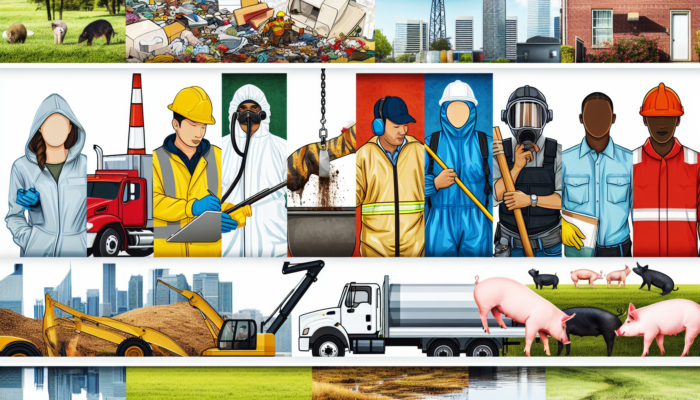We often fantasize about glamorous careers, like being a star athlete or a renowned chef. However, some jobs are far from the limelight and instead dwell in the shadows of society, often deemed too dirty or disgusting for most. But for some brave souls, these roles not only pay the bills but offer a unique perspective on the world. Join me as we delve into the lives of individuals who tackle the dirtiest jobs on Earth. Get ready to be intrigued and perhaps a little grossed out!
The Unseen World of Waste Management
Imagine starting your day knowing you will be surrounded by trash, muck, and the remnants of society’s waste. For many waste management workers, this is a daily reality. They are the unsung heroes who keep our cities clean, ensuring that the refuse we produce is disposed of properly.
Every morning, these workers don their protective gear and set out in their trucks, ready to tackle the refuse that accumulates in neighborhoods. Their job is not just about collecting garbage; it’s about managing a massive amount of waste that could become a health hazard if left unattended.
From homes to businesses, they navigate through the streets, emptying bins and compacting trash. While most people turn their noses up at trash, these individuals take pride in their work, knowing that they are making a difference. After all, without them, our cities would be overrun with waste.
Diving Into the Depths: The Life of a Sewer Inspector
Down below the bustling streets lies another world—one that most people will never experience. Sewer inspectors are the brave souls who venture into the darkness beneath our cities, ensuring that the sewage systems are functioning correctly. They wear heavy-duty gear and often wade through murky waters filled with all sorts of unpleasant surprises.
But why would anyone choose such a job? For sewer inspectors, the thrill lies in the challenge and the necessity of their work. They face potential hazards daily, from toxic gases to the risk of collapsing tunnels. Yet, these workers are essential in preventing sewage backflows that could cause major public health issues.
Equipped with cameras and specialized tools, they inspect pipes, identify blockages, and perform maintenance. Their job may be dirty, but it’s crucial for keeping the cities running smoothly.
On the Front Lines of Animal Control
Animal control officers deal with various critters, from stray cats to aggressive dogs, and even the occasional snake. Their job goes beyond simply removing animals from public spaces; they are responsible for ensuring the safety of both the animals and the community.
These officers often find themselves in sticky situations. One day, they might be rescuing a trapped raccoon; the next, they are responding to a complaint about a loose pit bull. The unpredictability of the job is part of what makes it exciting.
However, it’s not always glamorous. Animal control officers often have to deal with unpleasant smells, injuries, and the emotional toll of euthanizing animals that are beyond help. Yet, their dedication to animal welfare shines through as they strive to educate the community about responsible pet ownership.
A Day in the Life of a Crime Scene Cleaner
When tragedy strikes, crime scene cleaners step in to restore order. These professionals are called to clean up after homicides, suicides, and other traumatic events. It’s a job that requires not only physical stamina but also emotional resilience.
Armed with specialized equipment and cleaning agents, these cleaners must meticulously sanitize the area, ensuring that all traces of the incident are removed. The emotional weight of their work can be heavy, as they are often confronted with the aftermath of someone’s darkest moments.
Despite the challenges, many crime scene cleaners find purpose in their work. They help families regain a sense of normalcy and closure, offering an essential service in society’s most trying times.
The Unique Job of a Roadkill Remover
Roadkill removal is yet another gritty job that few would willingly take on. These workers are responsible for clearing the remains of animals that have met unfortunate fates on the roads. This role is crucial for maintaining public safety and ensuring that the roads remain clear of hazards.
Armed with protective gear and a strong stomach, roadkill removers face all kinds of situations. From small animals like squirrels to larger creatures like deer, their job is to dispose of the remains while being mindful of the surrounding environment.
While the job is often met with disgust, those who undertake it do so with a sense of duty. They understand the impact that roadkill can have on traffic safety and wildlife populations, and they work diligently to mitigate those effects.
The Grimy Reality of Oil Rig Workers
Working on an oil rig is not for the faint of heart. These workers often find themselves in remote locations, surrounded by harsh weather conditions and the constant threat of accidents. Their work involves drilling for oil, which can be messy and dangerous, but the financial rewards are often significant.
Life on an oil rig is characterized by long hours and physically demanding tasks. Workers are exposed to the elements, and their daily routines can be unpredictable. Despite the risks, many find camaraderie among their colleagues, fostering a sense of brotherhood in their shared experiences.
The allure of high pay and the adventure of working in such an isolated environment attract many to this field. However, the job’s dangers and the relentless grime of working with oil are constant reminders of the price of this profession.
Embracing the Dirt: The Life of a Pig Farmer
Pig farming is a rustic profession that comes with its share of challenges. Farmers work long hours in less-than-ideal conditions, often surrounded by mud and animal waste. Yet, there is a certain pride that comes with raising livestock and producing food for the community.
Pig farmers are responsible for feeding, caring for, and managing their herds. This job requires knowledge of animal husbandry and a commitment to the well-being of the animals. Despite the hard work and the unpleasant odors, farmers take pride in their contribution to the food supply chain.
Many pig farmers also embrace sustainable practices, ensuring that their operations are environmentally friendly. They understand the importance of responsible farming and work diligently to maintain a balance between productivity and care for the land.
Finding Value in the Gritty Jobs
While the jobs we’ve explored may seem unappealing to many, they are crucial to the functioning of society. Those who take on these roles demonstrate resilience and a willingness to confront the less glamorous aspects of life. From waste management to animal control, each profession plays a part in keeping our communities safe and clean.
These workers may not receive the recognition they deserve, but their contributions are invaluable. They remind us that every job has its place and that there is honor in doing work that others may shy away from.
In a world that often glamorizes success, it’s essential to remember the importance of those who toil behind the scenes. They are the backbone of society, and their stories deserve to be told. So, the next time you encounter someone in one of these “dirty” jobs, remember the dedication and hard work that goes into their daily lives.





